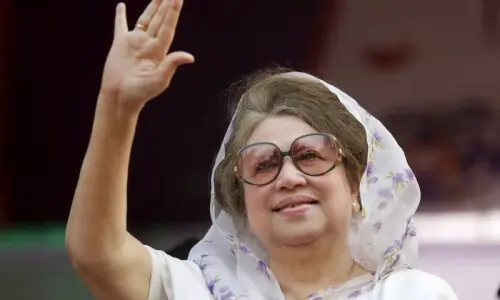Former Indian minister criticises BJP for declining Pakistan’s peace overtures

ISLAMABAD: India’s former foreign minister and key Congress leader, Salman Khurshid, criticised the ruling Bharatiya Janata Party (BJP) for adopting a tough stand towards Pakistan and said “when congress was in power, BJP had been pressuring it to not normalise ties with Pakistan”.
“India has not responded to Pakistan’s overtures for peace in South Asia the way it should have,” Khurshid said while speaking at the latest round of Jinnah Institute’s distinguished speaker series in Islamabad on Thursday.
Khurshid said it was courageous, brave and far-sighted of Prime Minister Nawaz Sharif to attend Indian counterpart Narendra Modi’s oath-taking ceremony in May 2013.
“However, the BJP led-government in India has failed to adequately reciprocate Islamabad’s peace overtures.”
Since 1947, the world has found solutions to several intractable disputes and conflicts, while the India-Pakistan confrontation has remained largely unchanged, he maintained.
Khurshid was of the opinion that Modi is still learning how to be a statesman, and if India wanted to move forward in its dialogue with Pakistan, it would have to take care not to unsettle the democratic political dispensation in Islamabad.
“A stable and successful Pakistan was in India’s interest, and vice-versa.”
India has a stake in the success of Pakistan far greater than the usefulness of a counterargument against its initial conception, Khurshid asserted.
While terrorism against any country was completely unacceptable, Pakistan itself had not been spared from this scourge, said the former foreign minister.
Khurshid also praised Pakistan’s fight against terrorism, and acknowledged the army’s role in fighting a difficult war in its tribal areas.
Speaking on the occasion, Jinnah Institute President and former Ambassador to the United States Senator Sherry Rehman noted that there were as many roads to peace and stability as there were to war and conflict in South Asia.
Senator Rehman said Pakistan was presently fighting one of the biggest inland wars ever fought, with little international help.
On the foreign policy front, she said, it still remained to be seen whether New Delhi had a clear policy on Pakistan.
In contrast, political parties across-the-board in Islamabad were unequivocal and on the same page when it came to making peace with India, she added.
She warned, however, that the strong public consensus in Pakistan for improved relations with India was breaking down due to conditionality and stark massaging by New Delhi.
“Track-2 exchanges between India and Pakistan were critical because of the cognitive disconnect between the two sides. Simultaneously, a new generation of youngsters in both countries was busy constructing new identities and ideas of themselves and their neighbour.”
Also speaking on the panel, former foreign secretary Riaz Khokhar was of the opinion that the past year had seen a number of setbacks for India-Pakistan relations.
Meanwhile, Jinnah Institute Honorary Vice President Aziz Ahmed Khan felt that the BJP government in New Delhi had already wasted too much time, and must now seriously move forward on all bilateral issues with Pakistan including connectivity.
During a lively and interactive question and answers session with the audience, Khurshid suggested that “divided families from either side of the border should be allowed multiple entry visas to facilitate travel.”
He also acknowledged and praised Nawaz Sharif’s remarks to the Hindus of Pakistan on the occasion of Diwali, and referenced Quaid-i-Azam Muhammad Ali Jinnah’s speech on secularism.


































